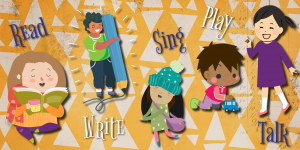
¿Quieres enseñar a los niños a pensar cómo científicos? Anímalos a jugar.
Las investigaciones han demostrado los beneficios que tiene el juego en el desarrollo de los conceptos de STEAM (Ciencia, Tecnología, Ingeniería, Arte, y Matemáticas). Las investigaciones también han demostrado que la participación de los adultos en el juego mejora el aprendizaje de los niños.
La repetición y la iteración lo practican los niños al experimentar con diferentes maneras de construir una torre alta con bloques de madera o al descubrir que el ángulo de una resbaladilla afecta la distancia en la que una canica se desplazará. Iterar un proceso quiere decir probar diferentes posibilidades, revisar diferentes hipótesis y descubrir preguntas nuevas que conduzcan al aprendizaje.
Cuando platiques con tus niños sobre los conceptos de STEAM, habla sobre ellos en el idioma que tú te sientas más cómodo. Las investigaciones demuestran que los niños bilingües entienden los conceptos matemáticos y desarrollan lo que llaman las “habilidades de pensamiento” con más facilidad.
Bebés
Cuenta con tu bebé. Cuenta los dedos de las manos y los pies de tu bebé cuando se están alistando para dormir o cuando lo estás bañando. Usa números durante el día. Canta canciones de números a los bebés para que puedan aprender conceptos numéricos y descubran patrones naturales.
Niños de 18 a 36 meses
Clasifica objetos usando diferentes categorías. Los juguetes y materiales que tienen en la casa pueden estar organizados por tamaño, figura, y por color. Habla con los niños sobre las características diferentes de los objetos. Esto ayuda a los niños a entender las categorías y respalda el desarrollo del pensamiento matemático.
Niños de edad preescolar
Imagínalo. Cuando los niños usan la imaginación al jugar, están desarrollando las habilidades del pensamiento matemático y la resolución de problemas. Están usando los conceptos de STEAM que incluyen establecer problemas, explorar soluciones, y elaborar el entendimiento de su mundo.
El pensamiento científico requiere curiosidad. Los niños sienten curiosidad por el mundo que los rodea, quieren aprender cómo funciona y les encanta hacer preguntas. Anima su curiosidad aun cuando tú no tengas las respuestas para todas sus preguntas.
¡No se les olvide divertirse!
-Sara, Bibliotecaria para niños, Biblioteca Valencia
STEAMing with Play!
Do you want to teach children about scientific thinking? One way to do it is by encouraging them to play.
Children learn about STEAM (Science, Technology, Engineering, Art, Math) when they play, so when you play with them you are supporting their curiosity.
Ask them questions while they are playing. By asking “what” and “why” questions expands their play and encourages developing and maintaining their curiosity.
Help increase their understanding in STEAM by speaking about it in the language you’re most comfortable with, in English, or both. Research shows that bilingual children have an easier time understanding math concepts and developing strong thinking skills.
Babies
Count with you baby. Count your baby's fingers and toes when you are getting them ready to go to sleep or when you are giving them a bath. Use numbers as you go about your day. Sing simple number songs to help babies learn patterns too.
Toddlers
Sort items into groups. Try sorting toys and other household items into different sizes, shapes, and colors. While you are sorting, talk to your child about which pile has more or what characteristics you are sorting by. This helps them understand categories, which supports mathematical thinking.
Preschoolers
Pretend play. Through play children engage in STEAM concepts daily; they actively pose problems, explore solutions, and develop understandings of the world around them. Thinking skills like math and problem solving in Dramatic Play through pretend grocery store, problem solving through imaginative play.
Scientific thinking requires curiosity. Children are curious about the world around them, want to know how it works, and love to ask questions. Encourage their curiosity even when you don’t know the answers to their questions.
Always remember to have fun!
-Sara, Children’s Librarian, Valencia Library
Source
Juega todo los dias: Guia para facilitadores. Plaza Sesamo (Sesame Workshop). ©2018 The LEGO Group
 Read, Write, Talk, Sing, Play!
Read, Write, Talk, Sing, Play!
Play comes so naturally to children and is an essential element to lifelong success. When children play, they are practicing and perfecting early literacy and life skills!
Read more about early literacy and how you can make a difference in your child's life.


